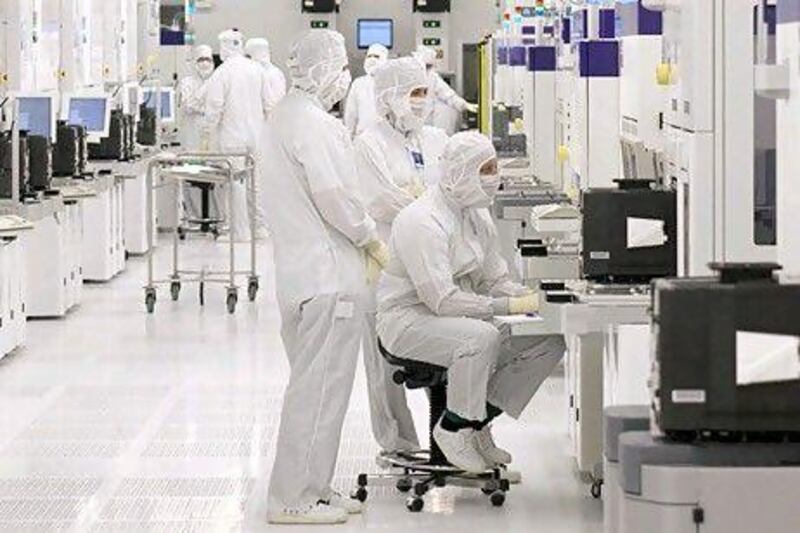Mubadala Development returned to profit in the first half of this year on new revenues from semiconductor manufacturing following a loss of Dh4.4 billion (US$1.19bn) in the same period last year.
The Numbers: Back in the black
Mubadala return to profit
The Abu Dhabi Government-owned strategic investment company, which sits at the forefront of the emirate's plan to diversify its economy away from oil, made a comprehensive profit of Dh198 million in the first half, it said yesterday. Comprehensive profits include both income from the company's business and fluctuations in the market value of investments.
Not counting swings in investments, however, Mubadala made a loss of Dh1.18bn in the first half compared with an adjusted Dh1.4bn loss in the same period last year. The stronger results came as revenues reached Dh13.6bn, up 70 per cent against Dh8bn last year. The value of Mubadala's assets also rose 67 per cent to Dh169.7bn.
Those rises were attributable primarily to the transfer of the Advanced Technology Investment Company (Atic) to Mubadala early this year. Atic, which bought the semiconductor manufacturing operations of the US-based Advanced Micro Devices in 2008, is the centrepiece of Abu Dhabi's chip-making investment strategy. It was previously owned directly by the Government.
"The first half of 2011 saw a clear and continued focus on the delivery of our unique mandate," said Khaldoon Al Mubarak, Mubadala's chief executive and managing director. "The consolidation of Atic adds further diversification to our revenues and underlines Mubadala's strategic intent to create globally competitive industry platforms that both accelerate the development of Abu Dhabi's economy and deliver socio-economic benefits to its citizens."
In addition to its microchip-manufacturing investment, Mubadala is behind some of Abu Dhabi's biggest business initiatives. It half-owns the new Emirates Aluminium smelter near the Abu Dhabi-Dubai border and is the developer behind Abu Dhabi's new business district on Sowwah Island. Mubadala is a major shareholder in General Electric and has an $8bn commercial finance joint venture with the US-based conglomerate.
Mubadala is also involved in aerospace through ventures including Strata, a plant in Al Ain that makes aircraft parts. Mubadala's Yahsat communications subsidiary recently launched its first satellite into space. Masdar, a carbon-neutral city near the Abu Dhabi International Airport, is another of its ventures.
Businesses such as those are making stronger contributions to Mubadala's overall revenues as they grow, but the company still relies heavily on revenue and profits from two energy companies it owns - Dolphin Energy, a gas pipeline company, and Pearl Energy, an exploration and production company operating in South East Asia. Oil and gas had a "strong performance" in the first quarter, Mubadala said, boosting revenues.
Compared to other factors, though, the integration of Atic into Mubadala's portfolio had the most dramatic effect on the conglomerate's financial performance.
Atic accounted for 40 per cent of Mubadala's revenues, with 28 per cent coming from hydrocarbons and 20 per cent coming from aircraft maintenance and repair.
Mubadala made Dh5.45bn during the half from the sale of semiconductors, its financial statements said. That compared with Dh3.78bn from the sale of hydrocarbons and marked a major shift towards high-tech as Abu Dhabi plans to pump billions more into semiconductor manufacturing. Atic's Globalfoundries manufacturing unit is growing its operations in the US and Europe and eventually plans to build a chip-making plant in Abu Dhabi.
"Mubadala's continued investment in its areas of focus has allowed it to better position its various assets and business units in preparation for their next stages of growth and to better counter and overcome the current market environment," Mubadala said.
Also during the first half, Mubadala took control of Tabreed, a district cooling company that needed help as part of a financial restructuring. Mubadala's interest increased from 15.8 per cent to 77.8 per cent following the conversion of bonds into equity and the conversion of loans to the company into bonds. It also took full ownership of a joint venture with John Buck International, a US property company.





